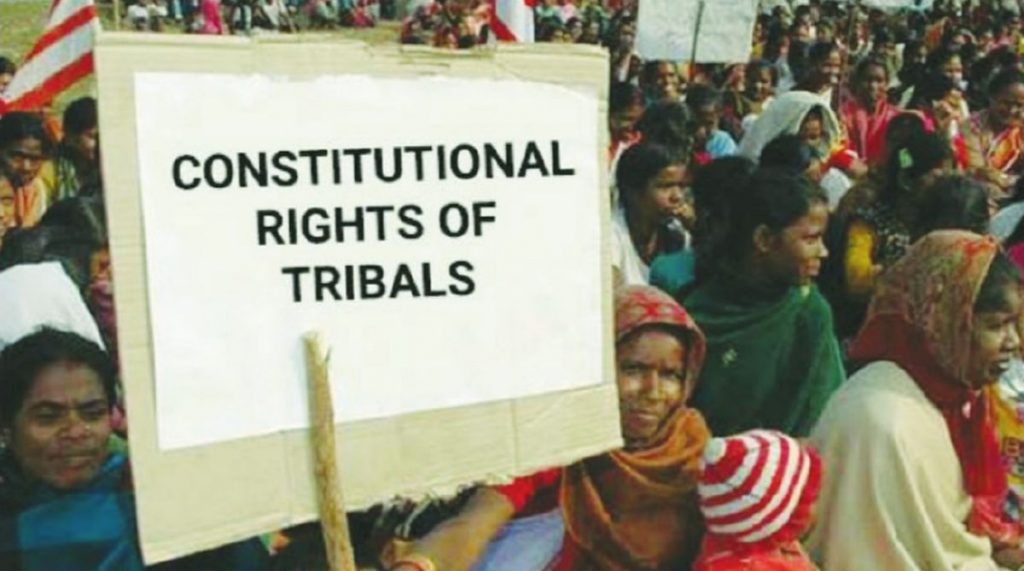India, a land of diverse cultures and traditions, owes much of its unique identity to the Scheduled Tribes (ST). These indigenous communities are not just an integral part of the nation’s heritage, but also the stewards of ancient wisdom and ways of life.
Despite their invaluable contribution, ST communities have often faced marginalization and struggles. Recognizing this, the Constitution of India has woven a safety net of provisions to safeguard their rights and interests.
In this blog post, we delve into the constitutional provisions that stand as the guardians of India’s Scheduled Tribes.
Constitutional Rights for Scheduled Tribes:
The architects of the Indian Constitution were deeply conscious of the need to uplift and protect the interests of the Scheduled Tribes.
Several articles within the Constitution are dedicated to their welfare:
Article 46:
With a vision of a just society, this article mandates the promotion of educational and economic interests of Scheduled Tribes. It reflects the commitment to bridge the gap between tribal and non-tribal communities, promoting equitable development.
Article 330:
To ensure that their voices are heard, the Constitution reserves seats in the House of the People (Lok Sabha) for Scheduled Tribes, allowing them to participate actively in the legislative process.
Article 332:
Recognizing the importance of representation at the state level, Article 332 reserves seats in the Legislative Assemblies of the States for Scheduled Tribes, amplifying their influence.
Article 335:
As equal participants in the nation’s progress, Scheduled Castes and Scheduled Tribes are ensured fair access to services and posts, without compromising on efficiency.
Provisions for Land and Identity:
Two vital schedules within the Constitution are dedicated to the protection of ST interests:
Fifth Schedule:
This remarkable provision grants special rights to tribal communities in Scheduled Areas, recognizing their distinct culture, traditions, and governance systems. It safeguards their customary laws, land rights, and traditional practices.
Sixth Schedule:
Acknowledging the unique identity of certain areas, this schedule empowers tribal regions in Assam, Meghalaya, Tripura, and Mizoram with autonomous councils. This autonomy preserves their cultural identity and governance.
Panchayats (Extension to the Scheduled Areas) Act (PESA), 1996:
Recognizing the wisdom of grassroots governance, this act empowers tribal self-governance, aligning with their cultural values and traditions.
Special Laws and Acts:
To counter the challenges faced by ST communities, India has enacted specific laws:
Forest Rights Act, 2006:
In a historic step, this act recognizes the forest rights of forest-dwelling Scheduled Tribes and other traditional forest dwellers. It acknowledges their historical association with the land and its resources.
Scheduled Castes and the Scheduled Tribes (Prevention of Atrocities) Act, 1989:
To ensure their dignity and safety, this act prohibits atrocities against ST communities. It aims to eliminate discrimination and foster an environment of equality.
Challenges and Advocacy:
- ST communities have encountered historical injustices and continue to grapple with contemporary challenges.
- Advocacy groups, NGOs, and social activists are the unsung heroes fighting for their rights, amplifying their voices, and pushing for policy changes.
Government Initiatives and Welfare Programs:
The Indian government has introduced numerous schemes that resonate with ST provisions. Initiatives like the Vanbandhu Kalyan Yojana are designed to uplift tribal areas comprehensively, addressing core issues like education, healthcare, livelihood, and infrastructure development.
Empowering Tribes through Knowledge and Education: Education holds the key to empowerment. Initiatives and organizations are working tirelessly to ensure that tribal children have access to quality education.
The establishment of Eklavya Model Residential Schools (EMRS) and scholarships like the Dr. Ambedkar Medhavi Chhatra Yojana exemplify this commitment to breaking barriers and empowering minds.
Preserving Cultural Heritage:
ST provisions are not confined to socio-economic development; they are instrumental in preserving cultural heritage. By safeguarding tribal languages, arts, music, and traditions, these provisions honor the rich tapestry of their identities.
What we think
India’s ST provisions are the embodiment of the nation’s commitment to inclusivity, diversity, and social justice.
As we celebrate their role as guardians of rights, we must remember that their effective implementation requires continuous vigilance and advocacy.
By raising awareness, supporting advocacy efforts, and standing in solidarity with tribal communities, we contribute to a future where their voices are not just heard but celebrated, their cultures thrive, and their rights are revered.
In this journey, let’s ensure that these guardians of rights remain a beacon of hope for generations to come.
